If you are looking to buy or sell development land you should be aware that Japanese knotweed can significantly reduce its value.
The reduction in value is normally calculated based upon the cost of remediation plus the risk factor for the inherent risks associated with developing knotweed affected land.
Typical risks include;
 Cost of remediation is relatively easy to determine, usually being assessed on worst case scenario physical excavation and off-site disposal to landfill, which can amount to tens, if not hundreds of thousands of pounds.
Cost of remediation is relatively easy to determine, usually being assessed on worst case scenario physical excavation and off-site disposal to landfill, which can amount to tens, if not hundreds of thousands of pounds.


 Delays in construction programmes cost money. Unfortunately, Japanese knotweed remediation is not a precise science and anyone with experience of working in the ground will appreciate that plenty can go wrong.
Common examples include encountering groundwater, ground contamination, below ground obstructions such as live services, all of which increasecosts and result in time delays.
Delays in construction programmes cost money. Unfortunately, Japanese knotweed remediation is not a precise science and anyone with experience of working in the ground will appreciate that plenty can go wrong.
Common examples include encountering groundwater, ground contamination, below ground obstructions such as live services, all of which increasecosts and result in time delays. For housing developments nearing completion, savvy solicitors acting for buyers will ask whether the site is or was previously affected by knotweed.
The developer will need to disclose the facts or risk future litigation. The buyer, backed by his solicitor and lender, may demand an insurance backed guarantee (IBG) for a period of 10 years. If it can’t be provided it’s likely the sale will stall.
A developer who does not disclose to a buyer that the land was affected by Japanese knotweed puts himself at unnecessary litigation risk. If Japanese knotweed emerges, the buyer as the new owner will be annoyed, and ask the developer to put things right. The new owner may also decide to claim for diminution in value.
If however the developer discloses that knotweed was present and offers a plot specific IBG from a reputable knotweed specialist the new owner will be able to call on the IBG. The developer in this instance should be better protected from any litigation risk.
A good knotweed specialist will help a developer choose the right remediation method, provide the guarantees likely to be required by any buyer and their lender, and avoid the myriad of pitfalls found on knotweed infested development sites.
Sign up for more Japanese knotweed Beacon Articles
For housing developments nearing completion, savvy solicitors acting for buyers will ask whether the site is or was previously affected by knotweed.
The developer will need to disclose the facts or risk future litigation. The buyer, backed by his solicitor and lender, may demand an insurance backed guarantee (IBG) for a period of 10 years. If it can’t be provided it’s likely the sale will stall.
A developer who does not disclose to a buyer that the land was affected by Japanese knotweed puts himself at unnecessary litigation risk. If Japanese knotweed emerges, the buyer as the new owner will be annoyed, and ask the developer to put things right. The new owner may also decide to claim for diminution in value.
If however the developer discloses that knotweed was present and offers a plot specific IBG from a reputable knotweed specialist the new owner will be able to call on the IBG. The developer in this instance should be better protected from any litigation risk.
A good knotweed specialist will help a developer choose the right remediation method, provide the guarantees likely to be required by any buyer and their lender, and avoid the myriad of pitfalls found on knotweed infested development sites.
Sign up for more Japanese knotweed Beacon Articles
- Difficulty in securing external funding on land affected by knotweed
- Delays caused by planning objections from aggrieved neighbours
- Civil nuisance claims by adjoining owners for knotweed encroachment
- Increased costs and delays to construction
- Saleability of the developed land
- Litigation risk post sale
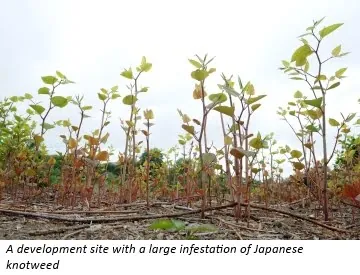 Cost of remediation is relatively easy to determine, usually being assessed on worst case scenario physical excavation and off-site disposal to landfill, which can amount to tens, if not hundreds of thousands of pounds.
Cost of remediation is relatively easy to determine, usually being assessed on worst case scenario physical excavation and off-site disposal to landfill, which can amount to tens, if not hundreds of thousands of pounds.
Assigning a value to the risks is a bit more subjective; price offered being dictated by the buyer’s perception of the risks. For a badly infested site in an area of relatively low land values one might find the land is worth very little.
Developers should take note of a survey carried out by YouGov and Environet in 2017, which found an astonishingly high level of knotweed awareness amongst UK homeowners, with 78% saying they would be put off buying a property affected by knotweed.
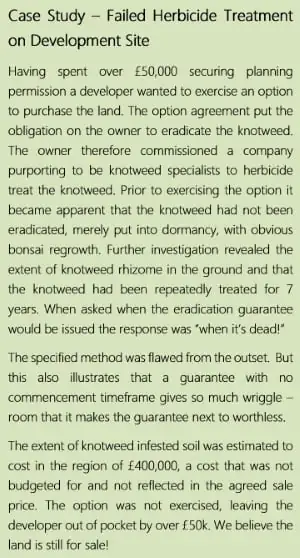
However, a good knotweed specialist can provide the key to maximising the development value by finding the most suited and cost-effective guaranteed remediation method, and by helping to manage the inherent risks.
Herbicide is the cheapest method. However, it takes repeated applications over many years, and even then, there’s no certainty that the plant’s root and rhizome system is dead, resulting in regrowth. It’s an accepted method if ground is not to be disturbed, and some regrowth can be tolerated.
Physical excavation of the root and rhizome system is a better method for development land, because it’s quicker and more effective. However, it’s expensive, especially if the infested soils are consigned to landfill.
There are other alternatives, notably Xtract™, developed and patented
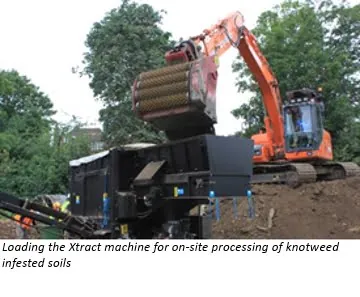
by Environet whereby infested soils are processed on site to remove the viable rhizomes.
The soils are re-used on site, thereby avoiding the excessive costs of off-site disposal and import of clean fill material.
This method typically costs half that of disposal to landfill, and comes with 10 year insurance backed guarantees, underwritten by an “A” rated syndicate at Lloyd’s.
You might think that having commissioned a specialist to get the site remediated is the end of your knotweed problems. Unfortunately that might not be the case, as risks remain that need to be managed.
It’s not uncommon to find neighbours trying to frustrate development by objecting to planning. Whilst this tactic is unlikely to succeed, it may result in the imposition of a planning condition that will need to be discharged prior to commencement on site. A reputable knotweed specialist should be able to assist.
Japanese knotweed does not respect property boundaries. Encroachment, the spread from one parcel of land to another, is common. Aggrieved neighbours are increasingly resorting to litigation to resolve such issues, so it is paramount that action is taken early to prevent or at least mitigate the risk to provide a strong defence to counter any expensive claim.
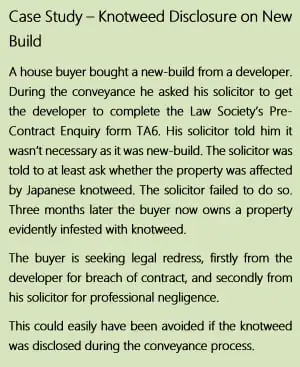 Delays in construction programmes cost money. Unfortunately, Japanese knotweed remediation is not a precise science and anyone with experience of working in the ground will appreciate that plenty can go wrong.
Common examples include encountering groundwater, ground contamination, below ground obstructions such as live services, all of which increasecosts and result in time delays.
Delays in construction programmes cost money. Unfortunately, Japanese knotweed remediation is not a precise science and anyone with experience of working in the ground will appreciate that plenty can go wrong.
Common examples include encountering groundwater, ground contamination, below ground obstructions such as live services, all of which increasecosts and result in time delays.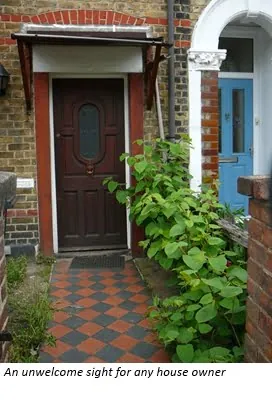 For housing developments nearing completion, savvy solicitors acting for buyers will ask whether the site is or was previously affected by knotweed.
The developer will need to disclose the facts or risk future litigation. The buyer, backed by his solicitor and lender, may demand an insurance backed guarantee (IBG) for a period of 10 years. If it can’t be provided it’s likely the sale will stall.
A developer who does not disclose to a buyer that the land was affected by Japanese knotweed puts himself at unnecessary litigation risk. If Japanese knotweed emerges, the buyer as the new owner will be annoyed, and ask the developer to put things right. The new owner may also decide to claim for diminution in value.
If however the developer discloses that knotweed was present and offers a plot specific IBG from a reputable knotweed specialist the new owner will be able to call on the IBG. The developer in this instance should be better protected from any litigation risk.
A good knotweed specialist will help a developer choose the right remediation method, provide the guarantees likely to be required by any buyer and their lender, and avoid the myriad of pitfalls found on knotweed infested development sites.
Sign up for more Japanese knotweed Beacon Articles
For housing developments nearing completion, savvy solicitors acting for buyers will ask whether the site is or was previously affected by knotweed.
The developer will need to disclose the facts or risk future litigation. The buyer, backed by his solicitor and lender, may demand an insurance backed guarantee (IBG) for a period of 10 years. If it can’t be provided it’s likely the sale will stall.
A developer who does not disclose to a buyer that the land was affected by Japanese knotweed puts himself at unnecessary litigation risk. If Japanese knotweed emerges, the buyer as the new owner will be annoyed, and ask the developer to put things right. The new owner may also decide to claim for diminution in value.
If however the developer discloses that knotweed was present and offers a plot specific IBG from a reputable knotweed specialist the new owner will be able to call on the IBG. The developer in this instance should be better protected from any litigation risk.
A good knotweed specialist will help a developer choose the right remediation method, provide the guarantees likely to be required by any buyer and their lender, and avoid the myriad of pitfalls found on knotweed infested development sites.
Sign up for more Japanese knotweed Beacon Articles 
